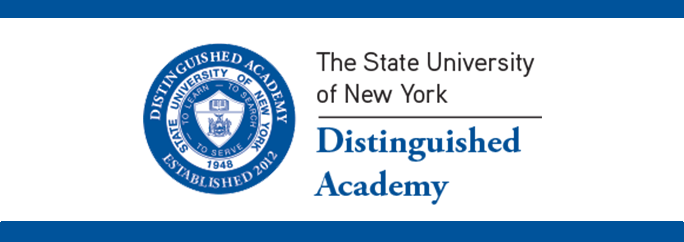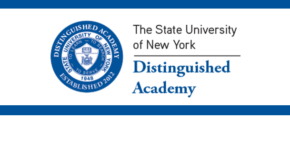
The Academic Minute from 11.09 – 11.13
Monday, November 9th
Richard Rosenfeld – SUNY Downstate Medical Center
Lifestyle Medicine and COVID-19
Richard Rosenfeld, MD, MPH, MBA is Distinguished Professor and Chairman of Otolaryngology at SUNY Downstate Health Sciences University, in Brooklyn, New York. He serves as Program Director for residency training, CEO of the University Physicians of Brooklyn ENT Faculty Practice, and Chair of the SUNY Downstate Committee for Plant-based Health and Nutrition. Dr. Rosenfeld follows a whole food, plant-based diet, runs marathons, and enjoys regular weight training. He participates in the American College of Lifestyle Medicine as an invited member of the Research Committee and Expert Panel, and chairs the Expert Consensus Panel on using a plant-based diet to treat and reverse type 2 diabetes.
Tuesday, November 10th
Andrew Kahn – SUNY Buffalo State
Story-Based Learning: Re-engaging a Disconnected Generation
Drew Kahn is a Distinguished Service Professor at SUNY Buffalo State where he has taught acting, devised theater (President’s Award for Excellence in Teaching/SUNY) and directed productions (Kennedy Center Award) for 26 years. He taught K-12 populations for 10 years previous to his work in higher education. He is the Founding Director of The Anne Frank Project, a multi-layered social justice initiative at SUNY Buffalo State that utilizes the wisdom of Anne Frank as a springboard for the examination of genocide and intolerance through the lens of story and performance. He presents and teaches internationally on the universal language of theater and the intersection of story, conflict resolution and community building—most recently in Rwanda, Kenya, Switzerland, the Democratic Republic of the Congo, Burma, Viet Nam, Morocco, New Zealand, Greece, Croatia and Turkey (Toby Ticktin Back Award for Holocaust Education, Community Leader Award, National Federation for Just Communities).
Wednesday, November 11th
Steven Fliesler – University at Buffalo
Searching for Answers to the Mystery of a Hereditary Blinding Disorder
After completion of a B.A. in Biochemistry at the University of California, Berkeley, Dr. Fliesler obtained a Ph.D. in Biochemistry from Rice University and did a postdoctoral fellowship at the Cullen Eye Institute, Baylor College of Medicine, in Houston. He held faculty appointments at Baylor College of Medicine, University of Miami Miller School of Medicine, and Saint Louis University School of Medicine prior to joining the faculty of the Jacobs School of Medicine and Biomedical Sciences at the University at Buffalo in 2008. His research is focused on inborn errors of lipid metabolism and their impact on the structure and function of the retina, as well as blast injury to the eye. His research program has been funded continuously for nearly 40 years by multiple grants from the National Eye Institute/NIH and, more recently, the Department of Veterans Affairs.
Thursday, November 12th
Miriam Rafailovich – Stony Brook University
Nanotechnology: An Example of Science with Social Responsibility
Miriam Rafailovich is a materials engineering researcher. She is the director of the Garcia Materials Research Science and Engineering Center at Stony Brook University as well as former co-director of the Chemical and Molecular Engineering program at Stony Brook University. Her publications focus mainly on nanoscale materials engineering, including nanofibers, supercritical carbon dioxide, and biodegradable polymers.
Friday, November 14th
Todd Sacktor – SUNY Downstate Medical Center
Traumatic Memories
Todd C. Sacktor is Distinguished Professor of Physiology & Pharmacology, Anesthesiology, and Neurology at SUNY Downstate Medical Center. He received an A.B. from Harvard College in 1978, and an M.D. with Distinction for Research in Neuroscience from the Albert Einstein College of Medicine in 1982. After a residency in Neurology at Columbia Presbyterian Medical Center, he studied the role of protein kinase C (PKC) in short-term memory using the model system Aplysia californica, in the laboratory of Dr. James H. Schwartz, at the Center for Neurobiology and Behavior, directed by Dr. Eric R. Kandel. In his own laboratory at SUNY Downstate in 1990, he discovered a brain-specific PKC isoform, PKMzeta. Together with colleagues, his laboratory demonstrated that PKMzeta was both necessary and sufficient for maintaining long-term potentiation (LTP) and storing the long-term memory trace.
